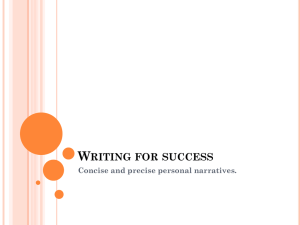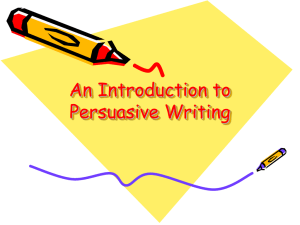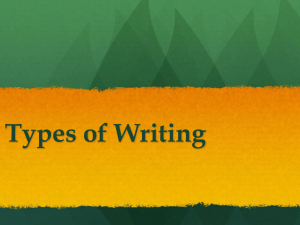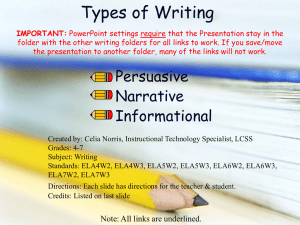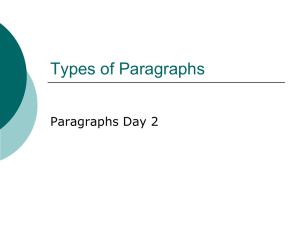Persuasive Writing
advertisement
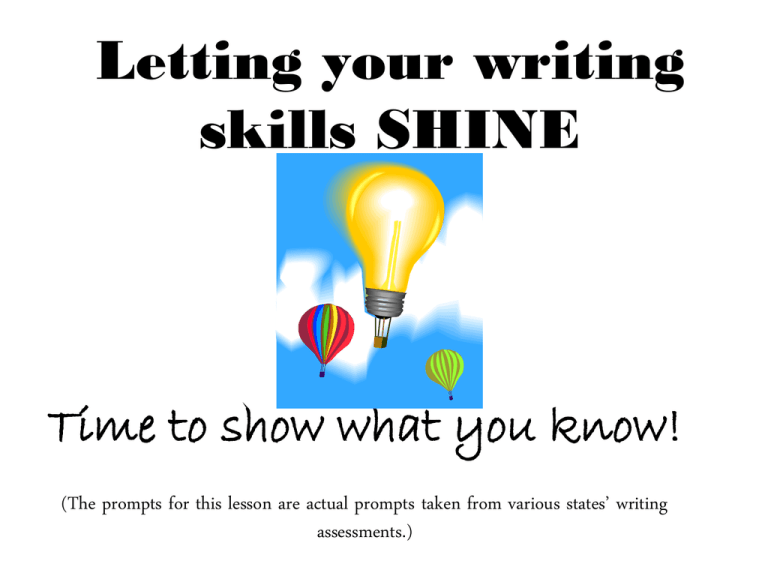
Letting your writing skills SHINE Time to show what you know! (The prompts for this lesson are actual prompts taken from various states’ writing assessments.) What type of prompt do you have? For the writing assessment, you will have one of the following types of prompts: • Narrative • Informational • Persuasive Step One: Understand the prompt • Is it a narrative topic? In a personal narrative, you are asked to tell a story about something that has happened to you. A fictional narrative asks you to make up a story, although fictional narratives are not as common in the writing assessment. Example: Most people can remember a day or event in their lives that they would like to relive. Think about a time that you would like to relive. What happened? Why would you like to relive it? Write about a day or event you would like to relive. Step One: Understand the prompt • Is it an informational prompt? An informational prompt is just like it sounds – you are writing to inform. Example: Your school is taking part in National Safety Week. During this time, students will focus on safety issues. Choose a safety issue you think is important. Explain the issue, including why it is a problem and some solutions for the problem. Step One: Understand the prompt • Is it a persuasive prompt? In a persuasive prompt the writer needs to try to convince, or persuade, the reader to accept the writers idea, request, or opinion. Example: Eating the proper foods is very important in order to stay healthy. Often, young people like to eat junk foods and they do not eat healthy fruits and vegetables. Write to persuade your friends that a balanced diet is important for staying healthy. Step One: Understanding the prompt • Read the prompt TWICE before you begin to plan to make sure you understand what you are being asked to do. • Read the prompt again before you start your rough draft, before you proofread and edit, AND before you start your final draft. Step Two: Plan-Develop your ideas • If you have a personal narrative that asks you to tell about something in your past, try to think of a couple of different ideas. Then, choose the idea you can write about with the best DETAILS! What is the best way to organize my writing? There is not necessarily one best way to plan your writing. An organized list using bullet points is one way that can be used to organize writing. Each bullet point could be a paragraph with ideas underneath, or you can group the bullet points with a box to set up your paragraphs. Developing ideas in narrative writing Think about a time you were surprised. It could have been a party or a time you got something you didn’t expect. It could be when you planned something and it didn’t turn out the way you thought it would. It could have been when someone came for a surprise visit. Surprises can be funny, scary, or exciting. Write about a time you were surprised New Puppy ٠Mom said no dogs -begged, but no, no, no ٠Christmas Day -presents-book, toys socks(?) -last box had chew toy? ٠Mom brought out puppy --SOOO happy -- Coco happy too Chocolate chip cookie disaster ٠ First time cooking by self with recipe ٠ Had cooked with mom, boxed mix ٠Belle & I gathered ingredients ٠measured flour, sugar carefully ٠ accidently put in 2 tsp of salt not 1 ٠ tried to fix by doubling rest of ingred. ٠ cookies came out ٠ looked great, tasted horrible ٠ found out we used tablespoon, not tsp ٠Now I use slice and bake cookies Developing ideas in narrative writing One day while you are out on a walk with a dog, the dog suddenly starts talking about where he used to live and how he would like to visit that place again. Write about what happens that day. . Adventure to big city • Start-normal walk in park - shocked when Spike talked - wants to see home in Atlanta • Had to take bus-never done --hid Spike-can’t be on bus --scary but exciting --talking about his past on way Mystery-How to find where he lived ٠ Start-normal walk in park ٠ Shocked when Spike talked ٠ Wants to see old home-have to find ٠ Follow the dog-sniffs the way ٠ Through odd places-junkyard, backyards with pools, etc, ++ ٠ Dog talking all way, sometimes warning • ٠ End-we arrive, meets mom, tells her he’s fine & happy in new home ٠ We head back for home From bus went to small house in between big apt bldgs -end w/ arrive, tell mom in good home & we head back What is the best way to organize my writing? Another way to organize your writing so that it can flow easily into paragraphs is by making a modified outline. The following examples show the same topic with two different plans. Which topic idea do you think the writer can do the best job of writing about? ** We will review another way to organize information in the next section. Developing ideas in narrative writing Choose a vivid time from your childhood. Narrate the events related to the childhood memory that you've chosen so that your readers will understand why the event was important and memorable. First Day of School A. Rode Bus B. Fun Classroom 1. Centers 2. Class Pet C. Teacher First Spend the night party A. Looked forward to for weeks 1. Bought pink sleeping bag. etc 2. Talked & talked about it B. Party Day 1. swam & played games 2. Ate Pizza, cake, ice cream C. Sleep time 1. Talked until midnight 2. Threw up pizza, cake, ice cream & went home Developing ideas in narrative writing Think of a time when you achieved a personal goal. Tell your readers about the story of how you met your goal. Be sure that your readers understand why the goal is important to you. Rode a bike Joined swim team A. Describe bike A. Excited, joined with 8 friends 1. blue, shiny, tassels 1. New suit, goggles B. Training Wheels 2. Pool looked so big & blue C. Wheels off B. First week of practice 1. Scared 1. SOOOO much harder than I thought 2. Dad helped Sore, never thought I’d learn butterfly 3. Wind in face 2. Friends ALL dropped out I did NOT want to be a quitter C. First meet 1. Made new friends, became fun 2. Finished third, but got better later Step Two: Plan-Develop your ideas • If you have an informational prompt you will again think about the best way to write DETAILS and EXAMPLES. Remember, your job is to explain and inform, but you still need good details and vivid, specific word choice. What is the best way to organize my writing? Both the organized list using bullet points and the modified outline are great ways to organize your informational writing. Many students learned to use webs to plan writing. An organizing map is a similar way to set up your writing that flows better into paragraph writing than a traditional web. Developing ideas in informative writing A role model is a person you admire or look up to. Before you begin writing, think about someone you look up to. Why do you admire this person? Write a composition in which you explain to your classmates whom you admire and why. Shaun White-Snowboarder Great Athlete Good Sport My Mom Hard Worker Helps me When I’m Sick Gold High Medal Jumps Nice to all others practices praise daily him Wow tricks Homework Practices ball with me Helps Others Works At Church Good Example Always Cheerful Very Organized Collects Blankets For homeless Helps neighbors Cooks Healthy Developing ideas in informative writing Weather is all around us. Some weather people like, while other weather can make people miserable. Write an informational paper telling about a type of weather. Be sure to tell about the type of weather in detail. Tell why this weather is good and/or bad what people do in this weather Step Two: Plan-Develop your ideas • If you have a persuasive prompt you have to use DETAILS and EXAMPLES to persuade the reader to agree with a point you are making. You need to use your details, examples, and good word choice to sway the reader’s opinion. Sell your point! Developing ideas in persuasive writing The local news station is choosing a local child to visit a brand new amusement park and appear on the news to tell other kids about it. Write a letter to the news station to persuade them to choose you. Developing ideas in persuasive writing Many boys and girls enjoy playing the same sport. Do you think boys and girls should be on the same team? Write to persuade the coach to agree with your opinion. Developing ideas in persuasive writing Your class is having a special lunch on graduation day. Choose your favorite lunch idea and write to persuade your classmates why your choice should be served. Step Three: Begin your paper with a grabber beginning Some strategies for grabber beginnings: • Ask a question • Use a quote or dialogue • Personal story/anecdote • Interesting fact • Onomatopoeia (when appropriate) Step 3 cont. – Examples of grabber beginnings. Ask a question: Narrative: Have you ever had a day when everything seemed to go wrong? Informative: Did you know there is a mammal that lays eggs? Persuasive: How would you feel if you found out your child was eating fattening chili dogs and greasy french fries for lunch every day? Step 3 cont. – Examples of grabber beginnings. Personal story/anecdote: Narrative: (This often is a personal story) Informative: When I was in third grade my family visited Germany. Our trip took us from a famous castle in the mountains to a museum with the first printing press. Germany is an interesting place. Persuasive: When I was in fourth grade, someone made fun of me because I didn’t have a shirt from the “popular” store. If our school had uniforms, no one would ever have to worry about what they wear. Step 3 cont. – Examples of grabber beginnings. onomatopoeia: Narrative: Woof-woof! That is a sound I had always wanted to hear, greeting me as I came home from school. Informative: Chirp, Chirp. I love the sound of waking up to birds outside my window on a spring day. Persuasive: Vroom, vroom. Keeping a car running and safe is an important job, which is why everyone should learn how to take care of their car. Step 3 cont. – Examples of grabber beginnings. Dialogue and an interesting fact are also great grabber beginnings. Narrative: “Sam, time to get up,” Mom called. Saturday had started out like an ordinary day. Informative: More than 75% of all the animals in the world are insects. One of the most important insects in our world is the honeybee. Persuasive: “Mrs. Jones, the homework last night really helped me understand area,” Ben announced. Ben can see why homework can really help students practice important skills. Step 3 cont. – Grabber beginnings. If you can’t think of a great grabber beginning, leave a space for your introduction and go on to stop 4. It is best, however, to get off to a great start with a great introduction. Step 4 - Write your rough draft by developing your ideas with DETAILS and EXAMPLES DO NOT JUST LIST YOUR IDEAS. When you state an idea, give details and examples that bring the idea to life in your readers mind. Step 4 - Develop your ideas with DETAILS and EXAMPLES Narrative Topic: Everyone has seen something happen that was just really strange or weird. Maybe it was something that was way beyond a normal daily event–an event you just could not magine happening. Write a narrative composition telling about ONE time you observed something that was really strange or weird. When you tell what happened, include specific details, descriptions, and reactions. As I watched the news, I could not believe what I was seeing. There, in the middles of a long line of honking cars and huge tractor trailers was a strange sight. A black and white striped zebra was making his way through the clogged downtown traffic, with police officers on motorcycles following close behind. Step 4 - Develop your ideas with DETAILS and EXAMPLES Informative Topic: It has been said that one of the most important things in life is a good friend. Write about someone you think has been a good friend to you. Last year, when my dog got very sick and had to have an operation, my friend Sarah came over to wait with me until my parents got back from the vet. When I cried, she never made fun of me, but sat with me and tried to comfort me. She even drew a get well card for Smoky, with a cute picture of a black lab with a bandage on his head. Step 4 - Develop your ideas with DETAILS and EXAMPLES Persuasive Topic: Your principal is considering replacing all physical education classes with study skills classes. Write to explain why you agree or disagree with this idea. Exercise is important to staying in shape and being healthy. We develop our muscles when we race from station to station, doing pull-ups and push-ups . . . . P.E. classes help more than our bodies. For many games, we have to be able to cooperate to reach a goal. Learning how to work as a team can help us in our classes, and even in the future in the work world. How does strong, specific word choice improve your writing? Narrative Topic: Everyone has lost something. Tell about what happened the time you or someone else lost something. Mom said not to borrow her new necklace, but it was so pretty, I decided to wear it to school anyway. The new necklace Mom bought at Macy’s was breathtaking. The necklace had one layer that was a shimmering golden chain, and another that was glimmering black crystals. At the end of both, there was a huge smoky brown topaz about the size of a quarter. While Mom clearly warned me not to even touch the necklace, I just HAD to wear it for school pictures. How does strong, specific word choice improve your writing? Informative Topic: Think about a persona goal you would like to reach in your life. Describe the goal and explain what you plan to do to reach your goal. I want to be the best swimmer in the world. I will need to practice a lot to reach my goal. I imagine myself one day standing on the podium at the Summer Olympics, hearing the National Anthem, and receiving my gold medal for the 100 yard backstroke. This won’t be easy to achieve. My plan is to start by joining a local swim team and practicing an hour a day. I think it would also be helpful to read how other swimmers, like Michael Phelps, became stronger in the pool. How does strong, specific word choice improve your writing? Persuasive Topic: The school board would like suggestions to improve your school Think of a way you would like to improve your school and persuade the school board to choose your idea. Our school needs a larger fence because a lot of balls get kicked over the fence. Please get us a larger fence. Our classroom started the year with a basket filled with kickball, footballs, and other playground balls. This helped make recess a fun time for everybody. There was usually a group playing four-square while other kids enjoyed a game of kickball. Many of the boys can’t wait to get outside to play a game of touch football. Unfortunately, once a ball flies over the four-foot fence, it is lost forever. Step 5 - If you are writing to a persuasive prompt, think of ONE argument against your point that you can address with a “fix” Address reader concerns: You might think the country would be a more peaceful place to live, but there are many quiet neighborhoods that are near cities, but still far enough away to be quiet and relaxing. Step 6 – End your paper with a strong conclusion to convince your reader. Strong Conclusion: You can see, Mom and Dad, that the benefits of living near a big city, such as plentiful jobs and a variety of shopping and entertainment, make living in the suburbs the best choice for our family. Step 6 – End your paper with a strong conclusion to convince your reader. Strong Conclusion: The quiet of the countryside, as well as the chances for our family to spend quality time together enjoying the outdoors should all be factors that show you what a great choice living in the country would be. Step 7 – Editing Go back through your paper and ask: • Did I follow the prompt? • Do I have a grabber beginning? • Have I organized my ideas in paragraphs? • Do all my ideas have details and/or examples? • Did I address reader concerns? • Did I use strong, creative word choice? • Do I have a strong conclusion? Step 8 – Final Draft As your write your final draft, continue to add descriptive word choice and details. Use your best handwriting—first impressions do count! When you are done, be sure you PROOFREAD carefully to catch those little mistakes. Read through at least three times and TAKE YOUR TIME. When you rush through, you read what you think you wrote, not what you actually wrote.

